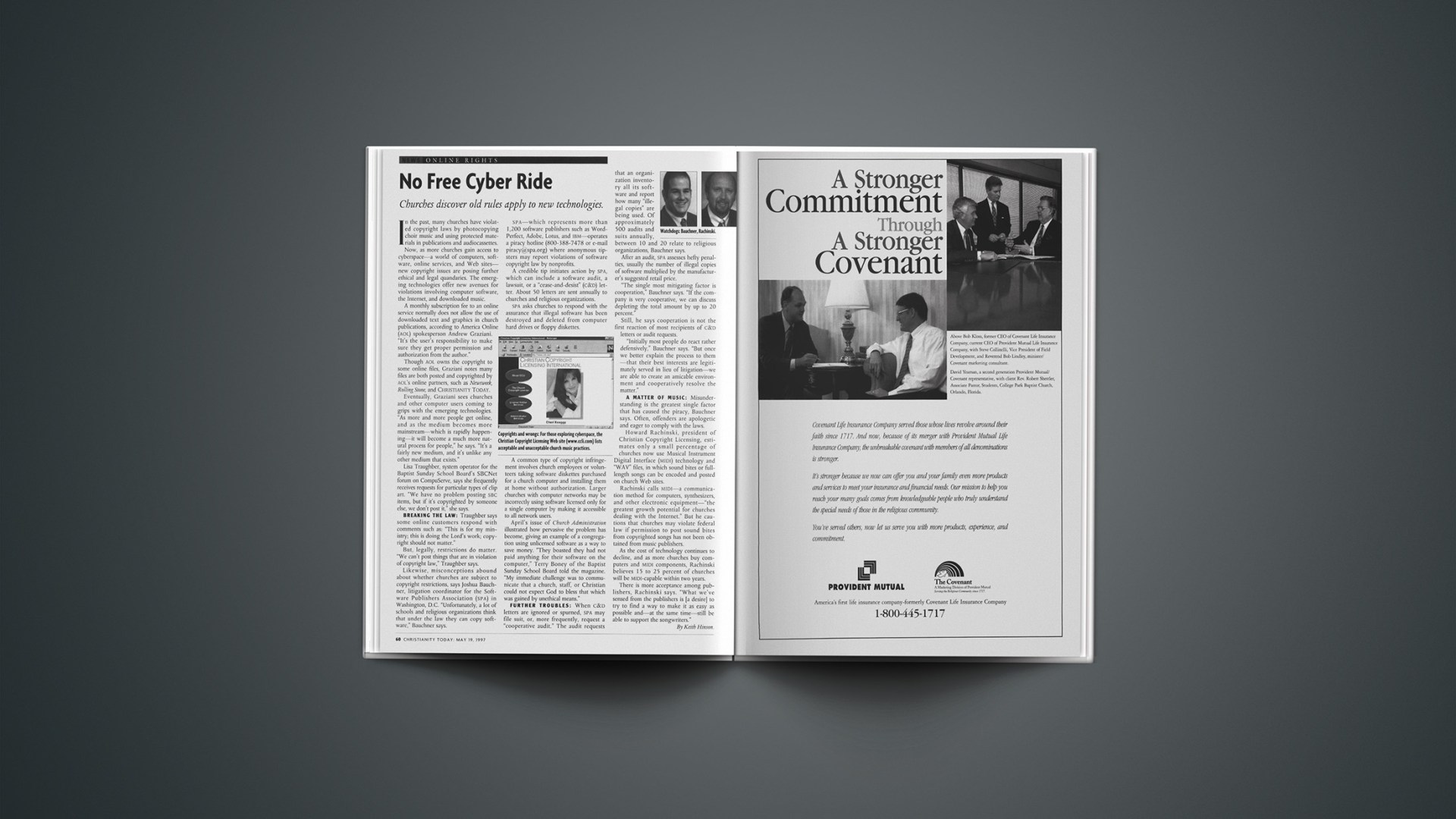In the past, many churches have violated copyright laws by photocopying choir music and using protected materials in publications and audiocassettes.
Now, as more churches gain access to cyberspace—a world of computers, software, online services, and Web sites—new copyright issues are posing further ethical and legal quandaries. The emerging technologies offer new avenues for violations involving computer software, the Internet, and downloaded music.
A monthly subscription fee to an online service normally does not allow the use of downloaded text and graphics in church publications, according to America Online (AOL) spokesperson Andrew Graziani. “It’s the user’s responsibility to make sure they get proper permission and authorization from the author.”
Though AOL owns the copyright to some online files, Graziani notes many files are both posted and copyrighted by AOL’s online partners, such as Newsweek, Rolling Stone, and CHRISTIANITY TODAY.
Eventually, Graziani sees churches and other computer users coming to grips with the emerging technologies. “As more and more people get online, and as the medium becomes more mainstream—which is rapidly happening—it will become a much more natural process for people,” he says. “It’s a fairly new medium, and it’s unlike any other medium that exists.”
Lisa Traughber, system operator for the Baptist Sunday School Board’s SBCNet forum on CompuServe, says she frequently receives requests for particular types of clip art. “We have no problem posting sbc items, but if it’s copyrighted by someone else, we don’t post it,” she says.
BREAKING THE LAW: Traughber says some online customers respond with comments such as: “This is for my ministry; this is doing the Lord’s work; copyright should not matter.”
But, legally, restrictions do matter. “We can’t post things that are in violation of copyright law,” Traughber says.
Likewise, misconceptions abound about whether churches are subject to copyright restrictions, says Joshua Bauchner, litigation coordinator for the Software Publishers Association (SPA) in Washington, D.C. “Unfortunately, a lot of schools and religious organizations think that under the law they can copy software,” Bauchner says.
SPA—which represents more than 1,200 software publishers such as WordPerfect, Adobe, Lotus, and IBM—operates a piracy hotline (800-388-7478 or e-mail piracy@spa.org) where anonymous tipsters may report violations of software copyright law by nonprofits.
A credible tip initiates action by SPA, which can include a software audit, a lawsuit, or a “cease-and-desist” (C&D) letter. About 50 letters are sent annually to churches and religious organizations.
SPA asks churches to respond with the assurance that illegal software has been destroyed and deleted from computer hard drives or floppy diskettes.
A common type of copyright infringement involves church employees or volunteers taking software diskettes purchased for a church computer and installing them at home without authorization. Larger churches with computer networks may be incorrectly using software licensed only for a single computer by making it accessible to all network users.
April’s issue of Church Administration illustrated how pervasive the problem has become, giving an example of a congregation using unlicensed software as a way to save money. “They boasted they had not paid anything for their software on the computer,” Terry Boney of the Baptist Sunday School Board told the magazine. “My immediate challenge was to communicate that a church, staff, or Christian could not expect God to bless that which was gained by unethical means.”
FURTHER TROUBLES: When C&D letters are ignored or spurned, SPA may file suit, or, more frequently, request a “cooperative audit.” The audit requests that an organization inventory all its software and report how many “illegal copies” are being used. Of approximately 500 audits and suits annually, between 10 and 20 relate to religious organizations, Bauchner says.
After an audit, SPA assesses hefty penalties, usually the number of illegal copies of software multiplied by the manufacturer’s suggested retail price.
“The single most mitigating factor is cooperation,” Bauchner says. “If the company is very cooperative, we can discuss depleting the total amount by up to 20 percent.”
Still, he says cooperation is not the first reaction of most recipients of C&D letters or audit requests.
“Initially most people do react rather defensively,” Bauchner says. “But once we better explain the process to them —that their best interests are legitimately served in lieu of litigation—we are able to create an amicable environment and cooperatively resolve the matter.”
A MATTER OF MUSIC: Misunderstanding is the greatest single factor that has caused the piracy, Bauchner says. Often, offenders are apologetic and eager to comply with the laws.
Howard Rachinski, president of Christian Copyright Licensing, estimates only a small percentage of churches now use Musical Instrument Digital Interface (MIDI) technology and “WAV” files, in which sound bites or full-length songs can be encoded and posted on church Web sites.
Rachinski calls MIDI—a communication method for computers, synthesizers, and other electronic equipment—”the greatest growth potential for churches dealing with the Internet.” But he cautions that churches may violate federal law if permission to post sound bites from copyrighted songs has not been obtained from music publishers.
As the cost of technology continues to decline, and as more churches buy computers and MIDI components, Rachinski believes 15 to 25 percent of churches will be MIDI-capable within two years.
There is more acceptance among publishers, Rachinski says. “What we’ve sensed from the publishers is [a desire] to try to find a way to make it as easy as possible and—at the same time—still be able to support the songwriters.”
Copyright © 1997 Christianity Today. Click for reprint information.










